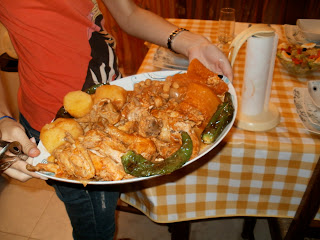I’ve had a decent number of people ask me what I’m doing in Tunis, so I figured I would write a somewhat detailed post about my job. Since the organization I’m working for is actually pretty interesting, I think this might be a worthwhile topic.
So my internship is with the organization AMIDEAST. You can read a ton of information on that website about the goals/history of AMIDEAST, but in a nutshell its main purpose is to promote cultural exchange between the United States and the Near East/North Africa. Given the relationship between the Western world and the Near East today, I think its safe to say that’s a pretty admirable/important goal.
AMIDEAST has sites across the region, from Morocco to the West Bank and Gaza. The exact programming offered at each of these places differs depending on the demands of the location and the length of time AMIDEAST has been in the country. The site in Tunis, where I am working, has been open for over thirty years now, so it is fairly established. Most of its programming is focused around ESL classes and study abroad opportunities (in the United States).
My boss (Jonathan Lange) just became (literally last Monday) the acting country director for Tunisia, but when I was hired he was more involved in the money management side of things. So my assignments have really been more focused on financial questions, rather than overall questions about how AMIDEAST should function.
When I first got here I had a long conversation with Jonathan about the problems involved in running a non-profit and staying afloat while also offering affordable programming. Unfortunately AMIDEAST cannot just depend on the government to write a blank check for everything they want to do, so they have to make smart financial decisions about expansion opportunities. This is where I come in.
AMIDEAST Tunis is considering opening a new site in another part of the city, one that would be larger and able to offer more services. However there are a lot of questions that must be answered before making such a large decision. Questions like: is there demand for more services? Would this new location be closer or father for the people AMIDEAST is serving now? Would opening a new site make AMIDEAST more accessible to people who might not be able to reach it now? Just like any for profit company, AMIDEAST must answer these questions or risk going under (and not providing any services).
My job for the past two weeks has been to look at the data AMIDEAST collects from its clientele and try to decide whether a new location makes sense. One of my first tasks was to evaluate the location data from current clients and see how they might relate to a new site. Although a lot of what I’m doing is pretty tedious, getting to see how decisions like this are made is pretty fascinating (At least I think it is). Just like any company AMIDEAST must try to figure out demand curves, and see if programs can be sustainable (both in terms of impact and financially). What makes this even more complicated though is that AMIDEAST has to figure this out in Tunisia as opposed to in the United States. Figuring out demand is one thing in a completely wired country where there is (fairly) easy access to a target population. Its entirely another in a place where wireless internet is not even close to ubiquitous (Our apartment sure doesn’t have it. We have to use a 3G key thing. Its really slow. I don’t want to talk about it) and the only way to do research is to go to an area and talk to people.
I read this article awhile ago, and I highly recommend it. It talks about Walmart’s expansion into China and all the complications that go along with it. Obviously the problems AMIDEAST faces in Tunisia are very different, but on a basic level they are the same—how do you figure out expansion issues in a country that is not completely developed.
As most of my friends know, I’ve never really been interested in business/finance type issues. I’ve taken an Econ class at Uchicago, but that’s about as far as my knowledge goes. That said, getting this internship and reading about China has made me seriously consider the value of my regional knowledge in other contexts. Although influencing government policy has always been my dream, being here and seeing what AMIDEAST does (and the considerations that go into it) has made me really think about other opportunities.
Anyway, sorry if this was significantly less interesting than the last post. I promise next week will be something more fun.























